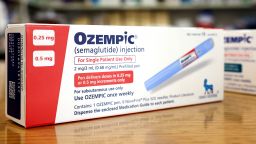Cheri Ferguson has traded her vape pen for an Ozempic pen.
One day seven weeks ago, “I thought, ‘you’re doing something about your weight; leave your vape at home,’ ” Ferguson said.
She hasn’t picked it back up since, she says.

Ferguson is one of many people taking Ozempic and similar drugs for weight loss who say they’ve also noticed an effect on their interest in addictive behaviors like smoking and alcohol.
A smoker for most of her life, Ferguson started Ozempic 11 weeks ago to try to lose about 50 pounds she’d gained during the Covid-19 pandemic, which had made her prediabetic.
She’d switched from cigarettes to vaping last summer in hopes of quitting but found vapes to be even more addictive. That changed, she said, once she started Ozempic.
“It’s like someone’s just come along and switched the light on, and you can see the room for what it is,” Ferguson said. “And all of these vapes and cigarettes that you’ve had over the years, they don’t look attractive anymore. It’s very, very strange. Very strange.”
Ferguson said she drinks less alcohol on Ozempic, too. Whereas she would have had multiple drinks in a pub while watching a football match in Buckinghamshire, UK, she’s now content with just one.
Some doctors say that when it comes to addictive behaviors, an effect on alcohol use is the most common thing they hear from people taking Ozempic or similar medicines.
“I have had a number of patients sort of describe that and ask about it because they’re curious about, you know, ‘hey, I’ve noticed this change; could that be due to this medication?’ ” said Jena Shaw Tronieri, an assistant professor of psychiatry and director of clinical services at the Center for Weight and Eating Disorders at the University of Pennsylvania’s Perelman School of Medicine.
Tronieri is running a clinical trial of semaglutide (the generic name for Ozempic – which is approved for diabetes – and Wegovy – approved for weight loss) to better understand its long-term effects on appetite. In many lifestyle modification trials she’s run, she’s never had participants report this kind of feeling about alcohol.
But with semaglutide, “people sort of describe, ‘You know what, I’m just not really interested in that anymore. I don’t feel like drinking,’” she said.
And when they ask whether it could be the drug, she tells them that there isn’t evidence to say so with certainty, “but there is some reason to believe that that could be one of the effects.”
Dr. Lorenzo Leggio is studying this issue at the National Institutes of Health. He and a team of researchers just published a study?showing that semaglutide reduces alcohol drinking in rodents.
Drugs like semaglutide, in a class known as GLP-1 analogues, may influence interest in things like alcohol because they have an effect not just in the gut but in the brain, Leggio said.
“We believe that at least one of the mechanisms of how these drugs reduce alcohol drinking is by reducing the rewarding effects of alcohol, such as those related to a neurotransmitter in our brain, which is dopamine,” he said. “So these medications are likely to make alcohol less rewarding.”
Their impact could go beyond alcohol and smoking; Leggio said his team is also studying whether semaglutide has an effect on fentanyl-use disorder. And the Atlantic recently reported that people taking Ozempic have said it’s helped them stop addictive behaviors like nail-biting and online shopping.
“There is a lot of overlap in the neurobiological mechanisms that regulate addictive behaviors in general,” Leggio said. “So it’s possible that medications like semaglutide, by acting on this specific mechanism in the brain, they may help people with a variety of addictive behaviors.”
More research needs to be done, particularly human clinical trials, to prove that semaglutide and similar medicines have this effect, he said.
But there aren’t many underway. One set, looking at semaglutide’s effect on alcohol and cigarette use, is being run out of the University of North Carolina.
“We?don’t yet have the clinical data necessary to draw conclusions,”?Christian Hendershot, an associate professor in the?Department of?Psychiatry and?the?Bowles Center for Alcohol Studies at UNC Chapel Hill, who’s running the trials, wrote in an email to CNN.?“It does seem very clear from people reaching out about our trials (in particular several treatment providers) that many patients are experiencing some significant secondary benefits from being on these treatments.
“To see this extent of anecdotal clinical data emerging prior to any human work being published,” he added, “is a relatively unprecedented situation.”
Novo Nordisk, which makes Ozempic and Wegovy, and Eli Lilly, which makes a similar drug called Mounjaro, said they aren’t currently studying these drugs for addiction.
“They have their hands full with obesity and related metabolic disease,” said Evan Seigerman, a pharmaceutical industry analyst who follows the companies for financial firm BMO Capital Markets.
And addiction drugs, particularly for alcohol-use disorder, haven’t been a particularly profitable market for drug companies, despite a large need. More than 29 million Americans had alcohol-use disorder in 2021, according to the National Institute on Alcohol Abuse and Alcoholism, but less than 5% receive drug therapy, research from financial firm TD Cowen found.
Available drugs like Vivitrol didn’t see major use when they reached the market?as physicians may not have been familiar with treating alcohol dependence with medicines, Cowen said. Another drug, Antabuse, is a pill that makes people feel terrible if they drink alcohol while they’re on it. Compliance is a problem, Cowen’s research shows, because people can just stop taking it if they want to drink.
“U.S. Antabuse sales,” Cowen’s analysts wrote, “are negligible.”
Get CNN Health's weekly newsletter
- Sign up here to get The Results Are In with Dr. Sanjay Gupta every Tuesday from the CNN Health team.
Leggio said he was disappointed but not surprised to hear that pharmaceutical companies weren’t studying GLP-1 drugs for addiction, adding that a lack of drug industry-sponsored trials?for addiction treatments?are a notable problem for the field.
But trials are what will be needed to prove that the experiences reported by Ferguson and many others are true effects of the medicines.
Ferguson said she’s lost 38 pounds since starting Ozempic. But more important to her, she said, is how the drug has helped quiet constant thoughts about food, vaping or alcohol.
“If I knew I would be feeling this way, I probably would have done this a year ago when I first started struggling” with weight gain, Ferguson said. “The weight that it takes off your mind is far greater than any pounds that can come off your body.”



